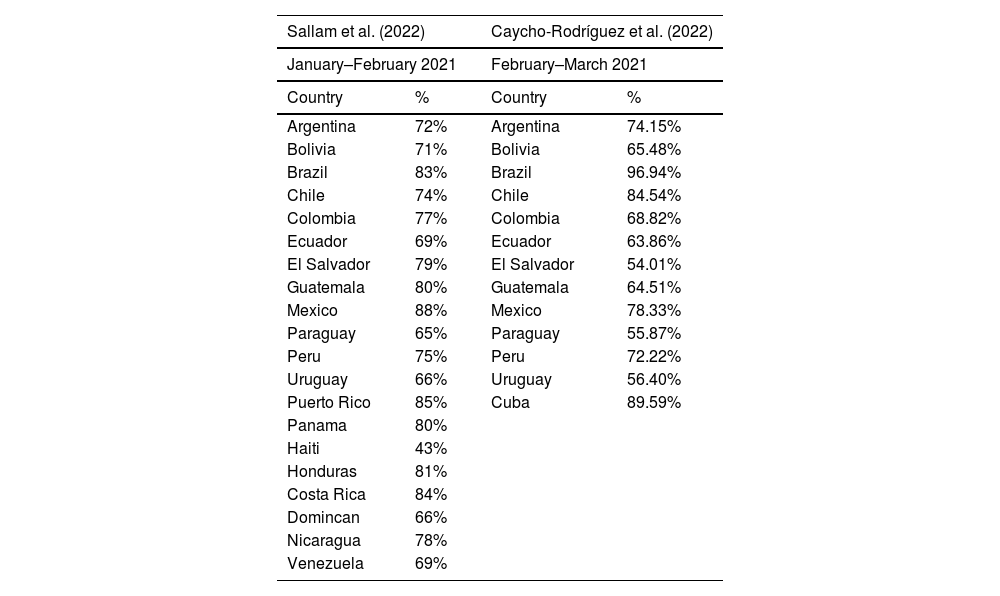COVID-19 vaccination has had two main limitations. First, difficulties in production, access and equitable distribution among the different countries and regions of the world.1 Second, hesitancy and rejection of COVID-19 vaccines due to people's lack of confidence regarding their efficacy, safety and possible adverse health effects. The first has been partially addressed by the COVAX program, co-led by the World Health Organization (WHO), but the second, concerning hesitancy towards vaccines, constitutes one of the top 10 global threats to public health, according to the WHO itself. Numerous studies have investigated people's hesitancy or refusal of COVID-19 vaccines, and valuable information is available for different countries around the world.2,3 However, for Latin America, the information available is quite limited,3 perhaps due to the scarcity of research studies in this region. The studies that have specifically addressed this problem in Latin America and the Caribbean are based on secondary information,4 extracted from other studies and Facebook. Specifically, the recent study published by Sallam et al.2 integrates the information retrieved from these secondary sources. However, a new study has just been published on the intention to receive a COVID-19 vaccine in 13 countries in Latin America and the Caribbean, whose data, collected directly from the Latin American population, serve as a contrast to the data used in other studies.5
As can be seen in Table 1, there are variations in the percentage of people who intended to be vaccinated against COVID-19 between the two studies. These variations may be related to the number of people surveyed. The study by Sallan et al.2 used results from Urganga-Pastor et al.,4 where samples exceeded thousands of people; meanwhile, in the study by Caycho-Rodríguez et al.5 the samples ranged from 300 to 800 participants for each country. Likewise, the study of Urganga-Pastor4 had the participation of 20 countries; and in Caycho-Rodríguez et al.,5 13 countries participated. The countries of Latin America and the Caribbean had different degrees of success or failure in managing the pandemic and vaccinating their populations. In this context, it is likely that those people who showed more distrust of their authorities were less willing to be vaccinated against COVID-19.6 Another possible explanation is that both studies collected data at different times during the vaccination initiation period of the population at risk and health personnel in Latin America and the Caribbean. As is well known, the time factor is important given the dynamic characteristics of the pandemic, not only because of the risks it implies for public health, but also because of the actions of governments and the perception of the people. An interesting aspect is the identification of a significant variability in the number of people who hesitate or do not intend to be vaccinated between countries, ranging from 3.06% to 57%, which would hinder herd immunity in certain countries. Taken together, these data support the widespread view of implementing vaccination campaigns aimed at fostering greater confidence in the safety of COVID-19 vaccines, as well as the need for further studies to report on progress in the COVID-19 immunization process.
Vaccination intention studies in Latin America and the Caribbean.
| Sallam et al. (2022) | Caycho-Rodríguez et al. (2022) | ||
|---|---|---|---|
| January–February 2021 | February–March 2021 | ||
| Country | % | Country | % |
| Argentina | 72% | Argentina | 74.15% |
| Bolivia | 71% | Bolivia | 65.48% |
| Brazil | 83% | Brazil | 96.94% |
| Chile | 74% | Chile | 84.54% |
| Colombia | 77% | Colombia | 68.82% |
| Ecuador | 69% | Ecuador | 63.86% |
| El Salvador | 79% | El Salvador | 54.01% |
| Guatemala | 80% | Guatemala | 64.51% |
| Mexico | 88% | Mexico | 78.33% |
| Paraguay | 65% | Paraguay | 55.87% |
| Peru | 75% | Peru | 72.22% |
| Uruguay | 66% | Uruguay | 56.40% |
| Puerto Rico | 85% | Cuba | 89.59% |
| Panama | 80% | ||
| Haiti | 43% | ||
| Honduras | 81% | ||
| Costa Rica | 84% | ||
| Domincan | 66% | ||
| Nicaragua | 78% | ||
| Venezuela | 69% | ||
Given the variation in intentions in the percentage of people who intended to be vaccinated against COVID-19, some strategic lines of research can be suggested. First, the studies by Urganga-Pastor et al.,4 and Caycho-Rodríguez et al.,5 used a single question that may not capture all aspects of the intention to be vaccinated. Therefore, addressing the methodological problem regarding the measurement of the intention to be vaccinated would allow a better evaluation of the intention to be vaccinated. Second, all countries in Latin America and the Caribbean must develop strategies, such as the adaptation of public health messages, to strengthen confidence in vaccination. For example, it is necessary to highlight the efficacy and safety characteristics of vaccines. In this aspect, the media are important. However, the link between social networks and traditional media used by people with their attitudes, beliefs and behaviors related to COVID-19 needs to be evaluated more precisely.







